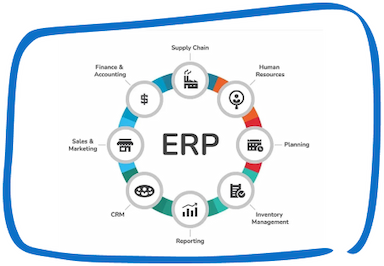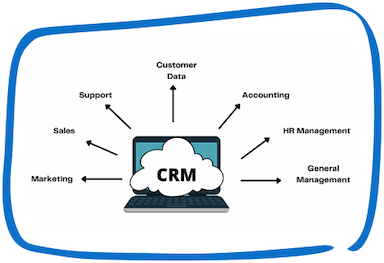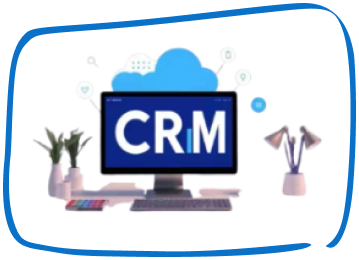The global CRM software market has surpassed all others in terms of size and importance. It is projected that by 2025, the CRM sector will generate more than $80 billion in revenue. CRM, which stands for Customer Relationship Management, enables you to meticulously track the customer history of each individual. The CRM system aids in preventing customer attrition by identifying problematic cases and addressing them promptly, thereby saving both time and money. CRM software is considered the most valuable asset, consistently proving its utility in today’s fast-paced business environment, ultimately enhancing business performance and profitability.
As previously emphasized, your customers are the focal point of your business, regardless of your business model. Placing your customers at the core of your attention can significantly impact your overall business earnings.
According to studies, nearly three out of every five customers (59%) are willing to switch to a different brand or service provider for a superior customer service experience.
While CRM development has always been an important focus for companies, it has now become even more crucial.
What is CRM Software?
CRM software is a set of applications that assist companies in managing their various customer-related activities. These software solutions combine all customer-related information into a single location. This consequently facilitates decision-makers in drawing insights and planning their future strategies. The primary objectives of CRM include customer retention and the promotion of sales growth.
An emerging trend in CRM is the adoption of cloud-based CRM solutions, which enable users to access the application via a web browser from any location. This approach ensures real-time access to information and enhances the efficacy of decision-making processes. As a result, it’s no surprise that many business owners are prioritizing CRM development within their organizations.
Why CRM Software is Your Business’s Most Valuable Asset
1. Efficiently manage leads and contacts
CRM software offers a centralized and constantly accessible online database. This systematic tracking system meticulously records all pertinent information related to client contacts, including their preferences for future meetings or discussions.
2. Track qualified and disqualified leads
Salespeople often make the costly mistake of investing significant time, effort, and resources into leads that are not fully qualified. They attempt to move these leads through the sales funnel, even though they may not be genuinely interested in making a purchase or may not be prepared to do so.
- CRM tools can prevent this by equipping your sales and marketing teams with various qualification parameters. It enables them to accurately assess a lead’s position within the sales funnel.
- For instance, a lead who has opened your email and explored your website should not be treated the same way as a lead who has visited your pricing page or signed up for a trial period. This information is crucial for tailoring your nurturing strategies at each stage of the sales funnel.
- Given that closing a sale is a time-intensive process, CRM tools help you efficiently nurture leads without squandering valuable resources.
3. Make timely follow-ups
Both the sales and marketing teams benefit from advanced knowledge of upcoming events, enabling them to manage their daily tasks more efficiently. Sales teams can also create reminders and automated alerts for their pending follow-up tasks on specific dates. Consequently, they can ensure that pop-up reminders appear when they access their screens on those days.
4. Monitor sales progress
Online CRM software management enables sales managers to closely monitor the progress of their teams. This feature allows them to track the status of various essential actions undertaken by their respective teams.
5. Make accurate documentation
Additionally, CRM systems designed for small and medium-sized enterprises (SMEs) facilitate the precise documentation of client communications. These documented comments are contributions from clients or staff members associated with the product and service market. Small businesses can use this input tracking to develop future company plans.
6. Track customer interactions
CRM serves as a valuable tool for tracking, monitoring, and reflecting on all customer interactions, whether they are positive or negative.
CRM can help
- enhance awareness,
- establish and nurture relationships with new clients,
- engage with them effectively,
- and build strong bonds.
- keeps you informed about the ongoing discussions within your organization
- assists in identifying areas that may require improvement.
With the CRM system, you can keep a comprehensive record of every customer interaction that occurs within your organization.
7. Ensure secured customer data
Your client data represents one of the most valuable assets you can cultivate, even in the age of cutting-edge technology. Shifting your perspective from viewing your client database as a mere collection of numbers to recognizing it as a repository of unique individual profiles can profoundly transform your approach. Implementing a CRM system grants you access to the data that embodies your most precious asset. Thus, it represents a significant step in the right direction for your company.
8. Gain customer feedback on one platform
Collecting reviews, comments on social media, blog posts, and other forms of feedback from a dedicated customer base can significantly boost your brand’s visibility among potential new clients. Word-of-mouth remains the most effective form of advertising for any business. Also, it is reasonable to expect positive reviews and endorsements from your loyal, long-term customers. Maintaining enduring connections with customers fosters loyalty to your business, benefiting both your present operations and your future prospects.
Additional Benefits of CRM Software
Cost Savings and Improved Productivity
CRM provides a range of supplementary benefits for small and medium-sized enterprises (SMEs). It includes various add-on features designed to reduce operational costs and enhance sales growth potential. SMEs gain access to a selection of quotes and order management add-ons, which serve to streamline and automate their sales processes. This sales automation not only boosts sales prospects and conversions but also enhances team productivity.
User-Friendly Cloud-Based Interface
The cloud-based user interface, characterized by its user-friendly design, serves as the solution for businesses seeking to refocus on customer service. Thus, it facilitates a seamless transition of clients and data to service providers. The customer relationship management (CRM) system meticulously records every customer interaction, spanning from your newest employee to the manager located just down the street. Consequently, your business can maintain a comprehensive record of each consumer interaction. Also, you can acquire valuable data that will ultimately strengthen your relationships with them.
Facilitating Data Analytics
A robust online CRM tool plays a pivotal role in establishing strong client relationships for your company. Sales managers and senior executives can leverage the customized and built-in data reports and metrics provided by the data analytics component of online CRM software to formulate more effective and efficient corporate strategies.
Seamless Multi-Channel Integration
The advantages of integrating CRM into your company are manifold. Online CRM software offers comprehensive multi-channel support, simplifying the management of customer complaints and inquiries across various contact channels. In addition to these lead management benefits, online CRM software extends a range of post-sale services to assist customers with their inventory, ERP, and help desk requirements. By eliminating manual interventions and repetitive tasks, this software also contributes to reducing overall corporate expenses.
Identifying Opportunities and Enhancing Operational Efficiency
Despite the availability of numerous CRM systems, they often fall short of offering a comprehensive solution. Recent technological and operational advancements have now enabled businesses to transcend the limitations imposed by conventional company management systems. In simpler terms, the CRM system not only addresses current business challenges but also provides a robust array of insights and recommendations. It significantly enhances operational efficiency and transforms management into a collaborative effort among all stakeholders involved in the organization.
The Bottom Line
When you become part of a company, the CRM system assumes a central role in all your activities. Its significance extends beyond the individual business functions; it ensures that everyone is consistently aligned in the same direction. Without a CRM system, maintaining a customer-centric focus becomes challenging.
However, companies that invest in CRM harness its value to place the customer at the core of their operations, which is the most expedient path to boosting sales and profits. Hopefully, the four reasons mentioned above underscore the fact that CRM is no longer an optional consideration but an indispensable necessity for your business.
Are you currently using a CRM system to manage your contacts and customer data? If you’re looking to embark on your CRM journey, we recommend trying Penieltech‘s Elate CRM and requesting a personalized demo.
Speak with Our Team!
4.9 Stars
1k+ reviews on






